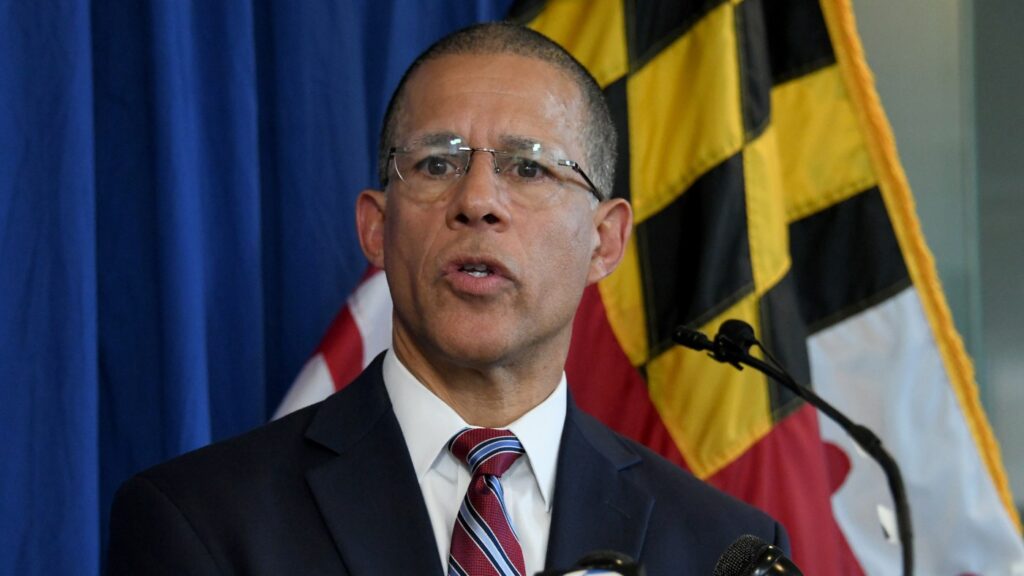Maryland AG defends Child Victims Act in constitutional challenge by Catholic Archdiocese of Washington
- January 10, 2024

Maryland Attorney General Anthony Brown is defending the state’s Child Victims Act from a constitutional challenge raised by the Roman Catholic Archdiocese of Washington in a pair of lawsuits alleging child sexual abuse by clergy.
With parallel briefs filed in lawsuits against the Washington diocese in Montgomery and Prince George’s counties, Brown, a Democrat, followed through on a pledge to defend the landmark law in court. His filings follow calls from abuse survivors to stand up for the law, which they fought the Catholic Church for decades to pass.
Maryland’s 2023 Child Victims Act lifted the statute of limitations for lawsuits alleging child sex abuse. It took effect Oct. 1 and was hailed as a victory by survivors, who sought the change so they could sue no matter how much time has passed since any alleged abuse.
A widely anticipated legal challenge to the new law came in November when the Archdiocese of Washington argued it was unconstitutional.
Lawyers for the church argue that in 2017, when the Maryland General Assembly expanded to age 38 the statute of limitations for people sexually abused as children to sue perpetrators or institutions that enabled their torment, it granted defendants immunity from such lawsuits after a victim’s 38th birthday. They said that immunity amounts to a “vested right.”
Attorneys for the men who sued Washington diocese fired back in December, saying the church’s interpretation of the law was misguided. The plaintiffs’ lawyers said legal precedent in Maryland and beyond contradicts the church’s position.
In legal briefs filed in late December in Montgomery and Prince George’s, Brown agreed.
“We are aware of no Maryland case holding that expiration of a statute of limitations or statute of repose provides a defendant with a vested right. What the Archdiocese asks this Court to rule would be unprecedented and would go against the consensus of federal law and the reasoned opinions of many other states,” Assistant Attorney General Jeffrey S. Luoma wrote in the Prince George’s County brief.
At the center of the legal debate is the question of whether Maryland’s legislature in 2017 created a statute of limitations or a rare legal provision known as a statute of repose.
Scholars say the only other statute of repose in Maryland deals with the construction industry. In that context, the legal provision protects the likes of builders and architects from liability related to injuries sustained in their structures after a certain amount of time passes following completion. Under the statute of repose, the clock for lawsuits starts ticking when the building is deemed operational. A statute of limitations, on the other hand, starts calculating the period for a civil claim from the time an injury is sustained.
Archdiocese attorneys contend the General Assembly can’t change a statute of repose, and say lawmakers’ attempt to do so violates Maryland’s constitution.
Plaintiffs’ lawyers countered by arguing the legislature can change any law it creates. Brown’s office concurred.
“Within its ability to set the time periods during which plaintiffs can file suit in court, the General Assembly has authority to revive causes of action that otherwise would be time-barred,” Luoma wrote. “This principle is well-established by federal courts and the courts of many other states and applies regardless of whether the provision effecting the bar is denominated a statute of limitations or a statute of repose.”
A spokesperson for the Washington diocese could not immediately be reached for comment.

Del. C. T. Wilson. sponsor of the Child Victims Act, meets with abuse survivors and advocates in the House chamber in 2023 after Gov. Wes Moore signed HB1 into law.
That Brown is going to bat for the child victims law hardly comes as a surprise. Last February, while lawmakers debated the legislation, he pledged to defend it in court. He doubled down on that position when survivors and advocates called on him to contest the constitutional challenge raised by the Washington archdiocese.
Maryland lawmakers expected a legal challenge to the child victims law. The legislation they passed last spring, signed into law by Democratic Gov. Wes Moore shortly thereafter, included a provision allowing for a mid-lawsuit appeal.
The law says either side can appeal a trial judge’s ruling on a defendant’s request to throw out a lawsuit, which is commonplace in civil cases. Typically, when a trial court denies a motion to dismiss a lawsuit, the case proceeds to trial.
Though an appeal from a county Circuit Court would typically go to the Appellate Court of Maryland, experts expect the Supreme Court of Maryland to take the case because of the unchartered legal terrain at issue. In the meantime, other judges presiding over claims brought under the Child Victims Act are likely to freeze those lawsuits until the state Supreme Court decides whether the law is constitutional.
It’s unclear which case will reach the pivotal point of appeal first, or if an appellate court will combine the cases on appeal given the parallel legal questions.
Brown’s office in April released the results of a four-year investigation into child sexual abuse in the Archdiocese of Baltimore. However, lawsuits against that archdiocese were halted when it filed for bankruptcy on the eve of the child victims law taking effect.
A class-action complaint, the lawsuit in Prince George’s County alleges three men were sexually abused as children at the Catholic schools or churches they attended in Maryland’s Washington suburbs. The men “have suffered serious and permanent physical, emotional, and financial injuries,” because of the abuse. They say the Washington archdiocese either knew, or should have known, about the predatory ways of the priests involved.
In the Montgomery County lawsuit, a man says he suffered “horrific” sexual abuse while attending a church in Gaithersburg as a child at the hands of two priests, including one with a well-documented history of abuse. Because of the abuse, the man “experienced significant anguish, culminating in a mental breakdown,” his lawsuit said. “In addition to extreme emotional distress, he has experienced physical sickness and dramatic weight loss.”
While in some cases the men are named in court documents, The Baltimore Sun does not name survivors of sexual abuse without their consent.
Sign Up For Our
Newsletter
Each day, we honor and remember those who have recently passed away.
Most Viewed
More
- Article Obituaries
- Celebrities
- Celebrity News
- Local
- News
- News & Advice
- NFL
- NHL
- Northside
- Norwin
- Obituaries
- Obituary
- Penn Hills
- Pirates
- Pitt
- Pittsburgh
- Plum
- Politics Election
- Premium Memorial
- Sports
- Steelers
- Theater Arts
- Top Stories
- Travel
- Tribune Review Obituaries
- US-World
- Valley News Dispatch
- West End
- Westmoreland
- World